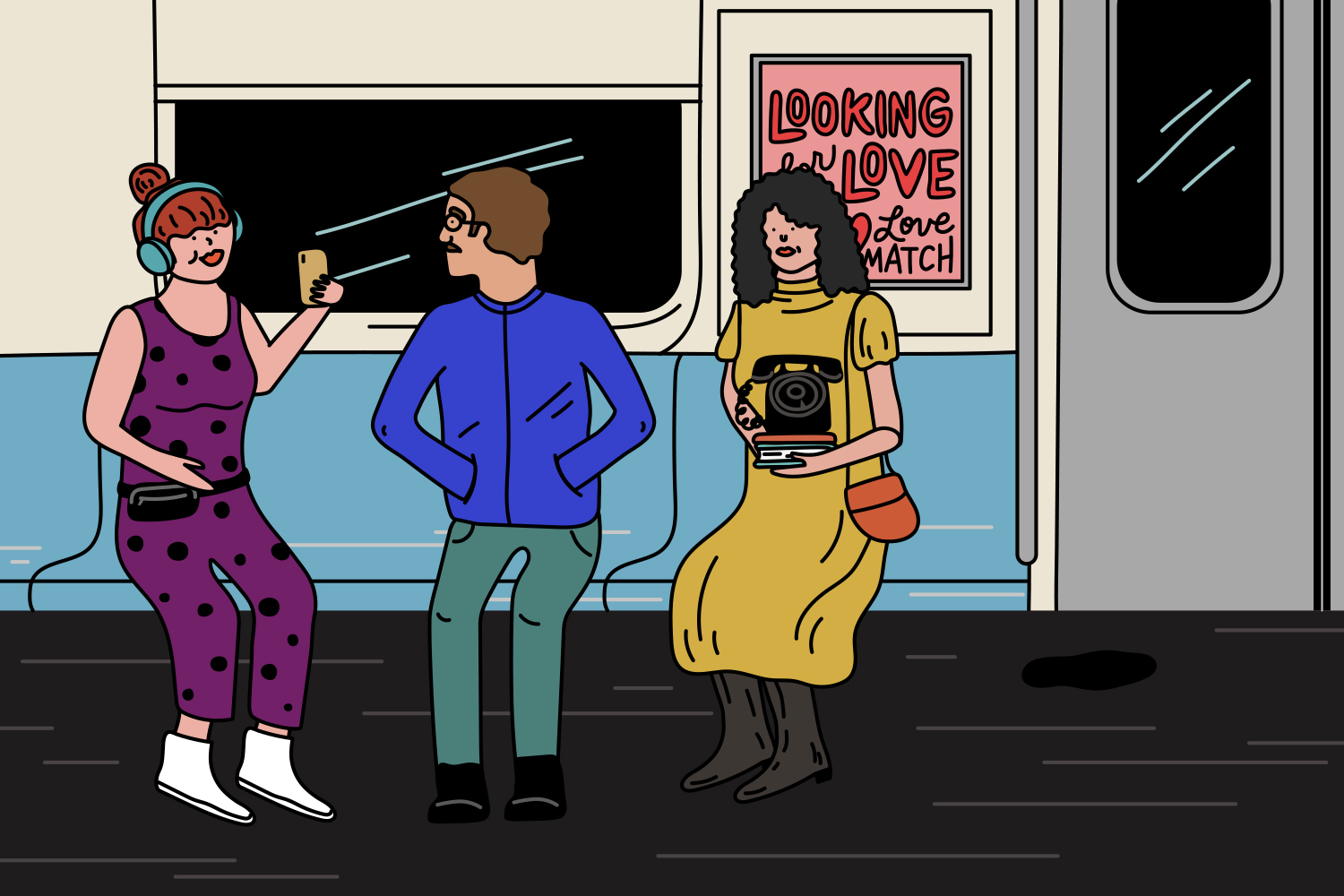You’re preparing for date night. Splayed across your bed are three possible outfits. That’s a moment for the ’gram.
What to wear!? #datenight
You meet up at the designated subway stop. It’s time to reveal what you chose to wear, and show off how good your date looks, too.
Heading out on our date! #datenight #ilovemyboo #brooklyn
The appetizer comes at the restaurant — that’s your third snap of the night. Then the entree — you know what to do. There’s another selfie together before paying the check to capture the ambience of the place; later, you bother some random person walking by for a full-body pic of the two of you cheesing under a marquee. Depending upon your level of social-media addiction, you might stop there, but you’re still going to upload all the images to Facebook, and maybe cajole your significant other into a rehearsed dance number for TikTok.
However, a new study suggests all this posting and boasting about your relationship on social media may be a sign — or even a cause — of trouble in paradise.
In a survey of more than 2,000 British citizens who are currently in a relationship, just 10 percent of those who post images of themselves and their partner on social media described the state of their couplehood as “very happy.” Nearly half — 46 percent — of respondents who do not publish such posts said that their relationship was, in fact, a very happy one.
Conducted by Shotkit, a virtual community of photographers, the survey polled people between the ages of 18 and 50 and asked them to “rank their relationship in regards to intimacy, communication and trust, as well as how much ‘couples content’ they share online.” Almost three quarters of the respondents who defined their relationships as either “very happy” or “happy” said that they “never” post couples content. Of the people who regularly share such posts, 42 percent said their relationship is “very unhappy” — emphasis mine.
“Perhaps the saying ‘too much of a good thing’ is true in this case,” said Shotkit founder Mark Condon in a statement about the results. “We expected there to be some disparities with the survey, but we didn’t know quite how much of a difference it could make in relationships.”
Apparently posting about your relationship online makes a big difference, and relationship experts agree such behavior may be inadvisable.
“Posts on social media can create unrealistic expectations for partners or lead them to feel that their partner is only interested in sharing how great the relationship is if it’s on public display,” says Jessica Small, a licensed marriage and family therapist, premarital counselor and dating coach based out of the Growing Self clinic, which has offices in three states. “When this happens, intimacy becomes lost and it decreases emotional safety.”
Small also says that a major drawback of social media is that it “takes people out of the here and now.” Instead of focusing on and appreciating the present moment — how good the food tastes at the restaurant, how enjoyable the movie is, how your connection with your partner is growing stronger — the priority is just “crafting a perfect post for Instagram.”
Furthermore, Small says one of the most frequent complaints she hears from couples is that they are frustrated with their partner’s phone use.
“Couples who feel satisfied in their relationship tend to put down their devices and spend time focused and present with one another,” Small observes. “It is very rare that couples report that they feel most loved by their partner when they share a social media post about their relationship.”
In terms of fostering a healthy partnership, posting photos and other couples content is, at best, unnecessary.
Michael Tubman, a 33-year-old performer and podcaster who’s been in a relationship for four years, says the two of them almost never post photos of themselves or provide status updates on social media, and they’re happier for it. “We have plenty of pictures of us, but they adorn our walls,” says Tubman. “A certain part of your relationship should be for you; it shouldn’t be for others.”
Personal trainer Ashley Dean, 29, who’s been with her boyfriend for nearly a year, has never shared a photo of the two together online that would reveal a romance. An Instagram post where she was running a race and he happened to be in the frame is the closest she’s come to sharing “couples content” in her current relationship.
Dean says she doesn’t believe it’s important to tell people she’s coupled up because she’s “still a very independent person” and her boyfriend supports that about her. In the past, around Instagram’s inception, Dean had put up pics of her and her partners, but in retrospect, she believes the practice ill-advised.
First, there’s the question of what to do with the posts after a breakup — keep them up or delete them, a lose-lose scenario. If you delete them, followers might inquire about what happened to the relationship, perhaps at a moment when you’d rather not discuss it. But if you keep the old pics up, it’s a misrepresentation of where you are in your life journey as it pertains to partnerhood.
Dean has also observed an evolution in how people approach social media platforms, namely Instagram, which has made posting to them more “loaded” and prone to drama. “No matter what you post, you’re going to get some kind of wild critique or feedback, or something that you were not expecting,” Dean says. “That can cause issues with relationships.”
Dean has witnessed instances where, say, a woman that Dean follows posts a pic of herself and her boyfriend. Suddenly, in the comments, followers will announce that they had been “talking to him” or claim that the man was cheating on the woman, generating discord without much context other than a dubious, hastily typed comment. Another friend was at one point so serious about her boyfriend — who constantly posted about her online — that she was considering marriage. When things eventually deteriorated, Dean says the friend may have stuck with him longer than she otherwise would have due to the pressures that came with the online portrayal of their happy partnership.
All of this needs to be considered before someone throws up posts about their relationship online. If it isn’t, problems may arise.
To mitigate such worries, one of Small’s Growing Self colleagues, Kathleen Carroll, a therapist, dating coach and premarital counselor, says that couples who post snapshots of their relationship online should “be mindful of your feelings and intentions.”
“It’s an opportunity to turn within and ask yourself, ‘Do I feel as happy in my relationship as I’m portraying online?’” Carroll continues. “If the answer is no, you may want to focus less on posting to create outward impressions and more on tending to your relationship.”
A huge no-no in Carroll’s mind is online sharing of “private conversations or intimate details of your relationship, such as your latest argument or gripe.”
“If you want your relationship to last and thrive, bashing or complaining about your partner on social media is off-limits completely,” Carroll says. She advises couples to keep their social media posts about the relationship “limited to the types of topics you’d share with an acquaintance, or even a stranger.”
“Social media has created a culture of comparative thinking and the increased need for external reassurance,” adds Small. “When couples post frequently about their relationship online they might find that they also are creating these phenomena in their relationships.”
Instead of engaging in such activity, Small suggests that couples share “authentic words of appreciation and love toward their partner directly.”
One reason Tubman says his relationship with his partner works so well is because they communicate very effectively. They also spent a lot of time getting to know each other before becoming a couple, and this high level of intimacy and mutual respect has afforded each of them the benefit of the doubt with the other. Tubman says that if he were to ever post something about his partner on social media that upset them, they’d simply approach him and ask him to take it down, without presumption that he tried to hurt them intentionally or was negligent in some way.
“It’s never going to be, like, they’re going to be silent for a week and a half, two weeks, and all of a sudden it’s going to turn into a fight and I don’t know what it’s about,” Tubman says. “These things can really grow ugly and fester inside your body if you hold onto them.”
He adds that, in general, it’s smart for people to keep aspects of their lives to themselves.
“It feels like when you’re constantly trying to put things out there, then you don’t have anything that doesn’t feel judged,” Tubman says. “The less you put out there, the more sacred things you have for yourself.”
And a partnership, founded on love and not affirmation from external sources, should probably fall into that category.
Whether you’re looking to get into shape, or just get out of a funk, The Charge has got you covered. Sign up for our new wellness newsletter today.

























